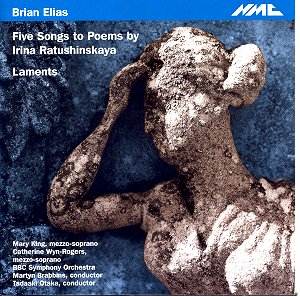Brian Elias, who studied with Humphrey Searle at the R.C.M. and with Elizabeth Lutyens, has so far composed a considerable body of work of which much is of high quality and of which very little is presently available in commercial recordings. So let it be said straightaway: this NMC release, coupling two fairly recent major works of Elias, is most welcome and will hopefully kindle some further interest in his varied output.
Five Songs to Poems by Irina Ratushinskaya is a substantial work completed in 1989. The composer tells how he was impressed by "the powerful imagery of resistance, the acceptance of shattering realities and the fantasies of different kinds of escape" and how he immediately wanted to set some of Ratushinskaya's poems. Though each setting is self-contained and quite different in mood, the cycle has to be played complete without breaks and its symphonic structure is clearly reinforced by the fact that the basic musical material, upon which most of the ensuing music is based, is stated in the first few pages. The first song, which is "about waiting to be arrested" alternates expression of resistance, optimism even and fearful anticipation. The second song is set as a simple ballad, in a fairly straightforward way, whereas the third song is a tragic and slow lament. The fourth song is more violent and ends with menacingly tolling bells. The last song somewhat reverts to the simpler mood of the second song and is a song about childhood and the sadness of growing-up. Elias's settings wonderfully reflect the various moods suggested by the poems and this beautifully moving piece is really very impressive indeed.
Laments, completed in 1998, is dedicated to the memory of the composer's mother. Elias decided to set texts written in Grico, basically Greek with Italian influences, still spoken in seven villages in Southern Italy. Keening or lamenting is common all around the Mediterranean Sea, e.g. in Italy, Greece or North Africa, where it is left to women to mourn and lament. So, Elias's piece may be heard as a ritual in which women express their grief in simple imagery and in which the mezzo-soprano, the "Prefica" (i.e. chief mourner), is accompanied by a group of keening women (a semi-chorus of six female voices here). The first song has the mezzo-soprano and the semi-chorus alternating whereas the second song is mainly for mezzo-soprano joined by the semi-chorus in the last stanza. The last song is clearly contrasted with the preceding ones in that its mood is somewhat lighter. Again, this is a very impressive piece of music which cannot fail to move.
Both soloists here are excellent and the BBC Symphony Orchestra play magnificently throughout these demanding pieces which really repay repeated hearings. These performances are well recorded and the audience in Laments is remarkably silent.
Brian Elias's music definitely deserves wider exposure and this very fine release will hopefully help achieving this, but I much regret that it was apparently not possible to include another piece by Elias for the playing time of this CD is rather on the short side. A pity; the more so given the scarcity of recordings of Elias's superbly crafted music.
Hubert CULOT

![]() Mary King (mezzo-soprano);
Catherine Wyn-Rogers (mezzo-soprano)˛; BBC Symphony Orchestra; Martyn
Brabbins; Tadaaki Otaka˛
Recorded : BBC Studio 1, Maida Vale, London, December 1997; live, Royal
festival Hall, London, November 1999˛
Mary King (mezzo-soprano);
Catherine Wyn-Rogers (mezzo-soprano)˛; BBC Symphony Orchestra; Martyn
Brabbins; Tadaaki Otaka˛
Recorded : BBC Studio 1, Maida Vale, London, December 1997; live, Royal
festival Hall, London, November 1999˛![]() NMC D 064 [54:25]
NMC D 064 [54:25]